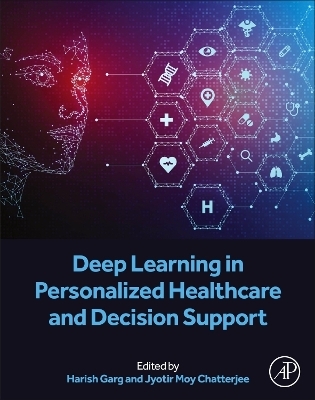
Deep Learning in Personalized Healthcare and Decision Support
Academic Press Inc (Verlag)
978-0-443-19413-9 (ISBN)
Although there is an increasing interest by clinicians and healthcare workers, they still lack enough knowledge to efficiently choose and make use of technologies currently available. This book fills that knowledge gap by bringing together experts from technology and clinical fields to cover the topics in depth.
Dr. Garg is Associate Professor of Mathematics at Thapar Institute of Engineering and Technology, Patiala, Punjab, India. He is the recipient of the Obada-Prize 2022 – Young Distinguished Researchers. He is also the recipient of the Top-Cited paper by an India-based author (2015 – 2019) from Elsevier Publisher. He also serves as an advisory board member of the Universal Scientific Education and Research Network (USERN). Dr. Garg's research interests include computational intelligence, multi-criteria decision making, evolutionary algorithms, reliability analysis, expert systems, and decision support systems, computing with words, and soft computing. He has authored more than 400 papers published in refereed international journals. He has also authored seven book chapters. He has also edited 8 books from Elsevier, Springer, and other publishers. Dr. Garg also serves on editorial boards of several leading international journals, this includes the Founding Editor-in-Chief of the Journal of Computational and Cognitive Engineering. He is also the Associate Editor of IEEE Transaction of Fuzzy Systems, Soft Computing, Alexandria Engineering Journal, Journal of Intelligent & Fuzzy Systems, Complex and Intelligent Systems, Journal of Industrial & Management Optimization, and CAAI Transactions on Intelligence Technology. He is currently working as an Assistant Professor in CSE at Graphic Era (Deemed to be University), Dehradun, India, and also as a Visiting Faculty in IT at Lord Buddha Education Foundation, affiliated with the Asia Pacific University of Technology & Innovation, Malaysia, in Kathmandu, Nepal. Previously, he served as an Assistant Professor and Program Leader for the B.Sc. IT program at Lord Buddha Education Foundation, and as an Assistant Professor in the CSE department at GD-Rungta College of Engineering & Technology, affiliated with Chhattisgarh Swami Vivekananda Technical University in Bhilai, India. He completed an M. Tech degree in Computer Science & Engineering from Kalinga Institute of Industrial Technology in Bhubaneswar, Odisha in 2016, and a B. Tech degree in Computer Science & Engineering from Dr. MGR Educational & Research Institute in Maduravoyal, Chennai in 2013. Machine Learning and Deep Learning are the person's research interests, specifically in the fields of advancements in these areas.
Part-1 Introduction of Deep Learning in Healthcare1. Exploration of Computational Frameworks of Deep Learning (DL) and Their Applications for Intelligent Health Diagnosis & Treatment Management Strategies 2. Fermatean Fuzzy Approach of Diseases Diagnosis based on a New Correlation Coefficient Operator3. Application of Deep-Q Learning in Personalised Healthcare IoT Ecosystem4. Dia-Glass: A Calorie-Calculating Spectacles for Diabetic Patients using Augmented Reality and Faster R-CNN
Part-2 Applications of Deep Learning in Healthcare5. Synthetic Medical Image Augmentation: A GAN based Approach for Melanoma Skin Lesion Classification with Deep Learning6. Artificial Intelligence representations model for drug target interaction with contemporary knowledge and development7. Review of Fog and Edge Computing Based Smart Health Care System using Deep Learning Approaches 8. Deep Learning in Healthcare: Opportunities, Threats & Challenges Green Smart Environment Solution for Smart Buildings and Green Cities: Towards Combating Covid-199. Hybrid and Automated Segmentation Algorithm for Malignant Melanoma using Chain Codes and Active Contours10. Development of a Predictive Model for Classifying Colorectal Cancer Using Principal Component Analysis11. Using Deep learning via LSTM model Prediction of COVID-19 Situation in India12. Post-Covid-19 Indian Healthcare System: Challenges and Solutions13. SWOT PERSPECTIVE OF INTERNET OF HEALTH OF THINGS14. Deep Learning for Clinical Decision Making and Improved Healthcare Outcome15. Development of No Regret Deep learning framework for Efficient Clinical Decision Making16. Symptom Based Diagnosis of Diseases for Primary Health Check-ups Using Biomedical Text Mining17. Deep learning for healthcare: opportunities, threats and challenges18. Deep learning IoT in Medical and Healthcare19. Deep Learning in Drug Discovery20. Avant-Garde Techniques in Machine for detecting Financial Fraud in Healthcare21. Predicting mental health using social media: A roadmap for future development22. Applied Picture Fuzzy sets with its Picture fuzzy Database for Identification of patients in a Hospital23. A Deep Learning Framework for Surgery Action Detection24. Understanding of Healthcare Problems and Solutions using Deep Learning25. Deep Convolution Classification Model-based COVID-19 Chest CT Image Classification26. Internet of Medical Things In Curbing Pandemics
| Erscheinungsdatum | 29.07.2023 |
|---|---|
| Verlagsort | San Diego |
| Sprache | englisch |
| Maße | 216 x 276 mm |
| Gewicht | 1110 g |
| Themenwelt | Mathematik / Informatik ► Informatik ► Theorie / Studium |
| Informatik ► Weitere Themen ► Bioinformatik | |
| Naturwissenschaften ► Biologie | |
| ISBN-10 | 0-443-19413-0 / 0443194130 |
| ISBN-13 | 978-0-443-19413-9 / 9780443194139 |
| Zustand | Neuware |
| Informationen gemäß Produktsicherheitsverordnung (GPSR) | |
| Haben Sie eine Frage zum Produkt? |
aus dem Bereich


